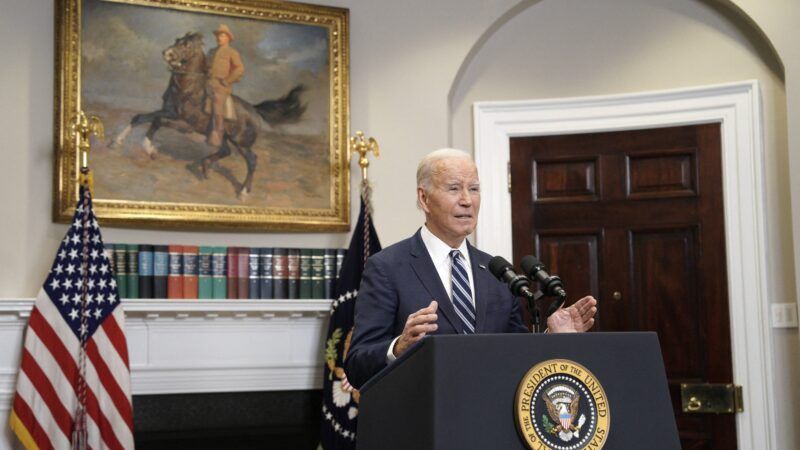Biden Announces New Plan To Forgive Student Debt in Cases of Financial 'Hardship'
The plan is the Biden administration's latest effort to enact large-scale student loan forgiveness.

On Thursday, the Biden administration announced a new plan to enact large-scale student loan forgiveness, this time by targeting borrowers experiencing financial "hardship."
Under the proposal, borrowers would be eligible for forgiveness if they meet certain criteria demonstrating financial hardship, such as their "total student loan balance and required payments relative to household income" and "high-cost burdens for essential expenses like healthcare or childcare," according to a Thursday press release. The goal of these standards is to identify students who are likely to default on their payments in the next two years.
The new proposal builds on rulemaking changes proposed in December, which seek to provide forgiveness to borrowers who saw their balances increase after not paying enough to cover interest and who have been paying for 20 or 25 years, among other groups.
It's unclear exactly how much these new changes will cost. But based on previous, smaller-scale student loan forgiveness measures, these changes are likely to cost taxpayers hundreds of billions of dollars. In the same press release announcing the new plan, Education Department officials bragged about approving $136.6 billion in student loan forgiveness through a series of forgiveness programs.
"The ideas we are outlining today will allow us to help struggling borrowers who are experiencing hardships in their lives, and they are part of President Biden's overall plan to give breathing room to as many student loan borrowers as possible," Under Secretary James Kvaal said in the press release. "It's an important part of the Biden-Harris Administration's permanent solutions to the problem of unaffordable loans."
Ironically, the Biden administration's "permanent solutions" to the student loan crisis will likely only end up making the problem worse. While supporters of the proposal say it would provide necessary relief for borrowers unlikely to pay their loans back, providing blanket forgiveness to those struggling to pay their loans back would likely end up incentivizing universities to hike prices and encouraging students to enroll in expensive programs.
If students know that they can have their loans forgiven as long they prove financial hardship, it will directly incentivize prospective borrowers to take on huge balances for dubiously valuable degrees. In turn, colleges can assure students that taking on tens—or even hundreds—of thousands of dollars in loans is a wise choice. After all, the government has promised to step in should repayment become burdensome.
While borrowers with too much loan debt deserve sympathy, the simplest—and least likely to backfire—solution to this problem is to allow student loans to be discharged in bankruptcy, not through sweeping, consequences-free forgiveness.


Show Comments (47)